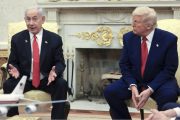
State Department spokeswoman Jen Psaki announced on August 4 that U.S. embassies and consulates in 19 Muslim nations will remain closed at least until the end of this week. Psaki stated that the decision to keep the diplomatic posts closed signifies an “abundance of caution” and is “not an indication of a new threat.”
Psaki said, in a statement quoted by AP and other news sources, that the extension of the closures is “merely an indication of our commitment to exercise caution and take appropriate steps to protect our employees, including local employees, and visitors to our facilities.”
The Obama administration announced on August 2 that the posts would be closed over the weekend. The State Department also announced a global travel alert, and warned that al-Qaeda or its allies might target U.S. government or private American interests.
Statements issued by the White House press secretary on August 3 and 4 read:
Early this week, the President instructed his National Security team to take all appropriate steps to protect the American people in light of a potential threat occurring in or emanating from the Arabian Peninsula. Given the nature of the potential threat, throughout the week, Assistant to the President for Homeland Security and Counterterrorism Lisa Monaco has held regular meetings with relevant members of the interagency to ensure the U.S. Government is taking those appropriate steps.
A CNN report of August 3, citing several U.S. officials who spoke on the condition of anonymity, identified the source of information related to the threat as “chatter” among al-Qaeda in the Arabian Peninsula that had been detected for weeks but had increased in the days preceding the heightened security alerts. Yemeni officials also provided a warning to the United States that contributed to the decision to close embassies in the region. While no exact target was ever mentioned, the U.S. embassy in Sanaa, Yemen, was regarded as particularly vulnerable.
CNN cited Seth Jones of the Rand Corporation, who said that these latest warnings coincided with news that Osama bin Laden’s successor, Ayman al-Zawahiri, has named the head of al-Qaeda in the Arabian Peninsula, Nasser al-Wahishi, as his overseer of the organization’s terror network.
Sen. Saxby Chambliss (R-Ga.), vice chairman of the Senate Intelligence Committee, speaking on Sunday’s ABC talk program This Week, said, “This is the most serious threat that I’ve seen in the last several years.”
The Los Angeles Times noted that several other Republican members of Congress approved of the Obama administration’s handling of this latest threat.
“The administration’s call to close these embassies … was actually a very smart call,” said Rep. Michael McCaul of Texas, chairman of the House Homeland Security Committee, speaking on CBS’s Face the Nation.
Rep. Peter King of New York, a member of the House Intelligence Committee, also speaking on This Week, said: “What [the Obama administration is] doing now has to be done.”
Sen. Lindsey Graham of South Carolina, speaking on CNN’s State of the Union, also praised the latest action: “I appreciate what the administration is doing with this…. The administration is doing this right.”
Interestingly, the Times noted that it was a Democrat, Rep. Adam B. Schiff of California, a member of the House Intelligence Committee, who, while approving of the administration’s actions in this instance (stating “we’re taking the precautions we should”) also disputed that the National Security Agency’s (NSA) practice of spying on Americans’ electronic communications was beneficial. Schiff, reported the Times, said there was no indication that the data leading to the embassies’ closures was collected from the NSA’s records of phone calls, emails, or other communications conducted within the United States.
A report in Euronews, based in France, also noted the NSA tie-in:
Some analysts have suggested that emphasizing the work of the National Security Agency in intercepting terrorist emails is a good way to deflect from the controversy over revelations about the U.S.’s mass surveillance program of citizens around the world.
A report from MSNBC also quoted from State Department spokeswoman Jen Psaki, who elaborated on our government’s reason for extending the closure of the embassies: “Given that a number of our embassies and consulates were going to be closed in accordance with local custom and practice for the bulk of the week for the Eid celebration at the end of Ramadan, and out of an abundance of caution, we’ve decided to extend the closure of several embassies and consulates including a small number of additional posts.”
A report from CNN, which the news network said it had voluntarily censored at the request of the Obama administration to protect sensitive information, quoted from the network’s own national security analyst, Fran Fragos Townsend, who offered an explanation for the State Department’s decision to close the diplomatic offices: “Once you take targets away, it buys you additional time to try and disrupt, to identify the cell, the operators in country and the region, and work with your partners in the region to try and, you know, get them in custody or disrupt the plot. So, some of this operationally is about buying time.”
It is possible that the Obama administration, having come under severe criticism for its mishandling of the September 11, 2012 attack on the U.S. diplomatic mission at Benghazi, Libya, that resulted in the deaths of four Americans, is excising greater caution this time around.
Photo of U.S. Embassy in Manama, Bahrain: AP Images




